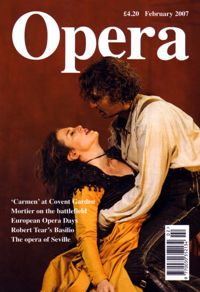 Carmen
is one of those great operas, like Don Giovanni, of which one is lucky to
see and hear a really satisfying and satisfactory performance once or twice
in a lifetime. It is difficult to cast the main roles ideally, but the rest
follows easily after that. That is the main problem with the new production
by Francesca Zambello, which celebrates the 60th anniversary of the
foundation of the Royal Opera immediately after World War II. The Carmen is
the Italian soprano Anna Caterina Antonacci, singing the role for the first
time in this house. She is an exciting artist who looks the part to
perfection, but is not vocally one of nature's Carmens, at least not until
the last scene when the music becomes more passionately Italianate and she
was in her element. Until then she had sung with a certain restraint, her
teasing of Don José more decorous than animal and her Habanera elegant. In
the Card Song, however, her dusky lower register provided real thrills. But
somehow one could not quite believe in this gypsy as a "free spirit". Carmen
is one of those great operas, like Don Giovanni, of which one is lucky to
see and hear a really satisfying and satisfactory performance once or twice
in a lifetime. It is difficult to cast the main roles ideally, but the rest
follows easily after that. That is the main problem with the new production
by Francesca Zambello, which celebrates the 60th anniversary of the
foundation of the Royal Opera immediately after World War II. The Carmen is
the Italian soprano Anna Caterina Antonacci, singing the role for the first
time in this house. She is an exciting artist who looks the part to
perfection, but is not vocally one of nature's Carmens, at least not until
the last scene when the music becomes more passionately Italianate and she
was in her element. Until then she had sung with a certain restraint, her
teasing of Don José more decorous than animal and her Habanera elegant. In
the Card Song, however, her dusky lower register provided real thrills. But
somehow one could not quite believe in this gypsy as a "free spirit".
On this occasion the star of the show was the German tenor Jonas
Kaufmann, in his role debut as José. From his first appearance he conveyed
the complex personality of this misfit and brought a Lieder singer's
intelligence to the role without sounding at any time un-operatic. The
Flower Song was exquisitely phrased, with an attention to Bizet's dynamics
which was as pleasing as it is rare. Tall, handsome and moody, he set a new
standard for the role; his final encounter with Carmen had one on the edge
of one's seat through his dramatic intensity. Escamillo was another
Italian singer, lldebrando D'Arcangelo, physically well suited to the role
but, like most Escamillos. uncomfortable in the lower notes of his famous
aria for all his vocal swagger and brio. The only French singer among the
principals was Norah Amsellem as Micaëla, a dull and pallid performance.
Matthew Rose was a commanding Zuniga and I liked the sound of the young
South African baritone Jacques Imbrailo as Morales.Antonio Pappano
conducted as if consumed a new with love for this music. His was a colourful
and sensitive-almost Beechamesque-account of the orchestral score, relishing
its fastidious detail and always maintaining pace and tension (but why the
cut in the last act?). He is always considerate to his singers and the
performance was notable for clear delivery of the French text. Zambello's
production brought no surprises, revelatory or disagreeable, except for
Lillas Pastia's change of sex and Micaëla's appearance in the crowd outside
the bullring, neither of any dramatic consequence. The crowd scenes
contained a horse and a donkey, and the smugglers abseiled into their lair
(why?). The children were well directed, but Zambello appeared to be
uninterested in the subsidiary characters-one scarcely noticed Frasquita and
Mercédès. It was a routine, unexciting staging, with designs by Tanya
McCallin that conveyed little sense of heat or squalor.
Carmen was chosen because it launched the company in January 1947. To mark
this there is an especially interesting programme
|